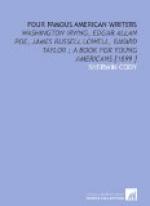He went to Philadelphia the next autumn, and consulted Griswold regarding a poetic romance he had written—about a thousand lines in length—and Griswold advised him to publish it in a volume with other poems. He wrote to a friend to inquire how much the printing and binding would cost, and finding that the expense would not be very great, he concluded to ask his friends to subscribe for the volume. When he had received enough subscriptions to pay the cost of publication, he brought the volume out. It was entitled “Ximena; or, The Battle of the Sierra Morena, and Other Poems. By James Bayard Taylor.” (The James was added by mistake by Griswold.) It was dedicated “To Rufus W. Griswold, as an expression of gratitude for the kind encouragement he has shown the author.”
The poems contained in this volume were never republished in after years. The book was fairly successful, and was distinctly a step upward; but it did not fill the young writer with undue conceit. In writing to a friend of his ambition at this time, he says: “It is useless to deny that I have cherished hopes of occupying at some future day a respectable station among our country’s poets. I believe all poets are possessed in a greater or less degree of ambition; it is inseparable from the nature of poetry. And though I may be mistaken, I think this ambition is never given without a mind of sufficient power to sustain it, and to achieve its lofty object. Although I am desirous of the world’s honors, yet with all the sincerity I possess I declare that my highest hope is to do good; to raise the hopes of the desponding; to soothe the sorrows of the afflicted. I believe that poetry owns as its true sphere the happiness of mankind.”
What could be nobler and more sensible than that! Even his earliest poetry has in it no false, slipshod sentiment. Its subject is nature and heroic incident, and is indeed a faithful attempt to carry out the aim so well stated above. Some have doubted whether Bayard Taylor really had the power which he says he thinks is given to all who have the ambition which he felt. But none can fail to admire the spirit in which he worked, and to feel satisfied with the results, whatever they may be.
CHAPTER V
A TRAVELER AT NINETEEN
It was not as a poet, however, that Bayard Taylor was to win his first fame. At the age of nineteen, when he had but half completed his four years’ term of apprenticeship, he made up his mind to go to Europe. He had no money; but that did not appear to him an insurmountable obstacle. He thought he could work his way by writing letters for the newspapers. So he went up to Philadelphia and visited all the editors. For three days he went about; but all in vain. The editors gave him little encouragement. He was on the point of going home, but with no thought of giving up his project.
At last two different editors offered him each fifty dollars in advance for twelve letters, and the proprietor of Graham’s Magazine paid him forty dollars for some poems. So he went back to Kennett Square the jubilant possessor of a hundred and forty dollars.




